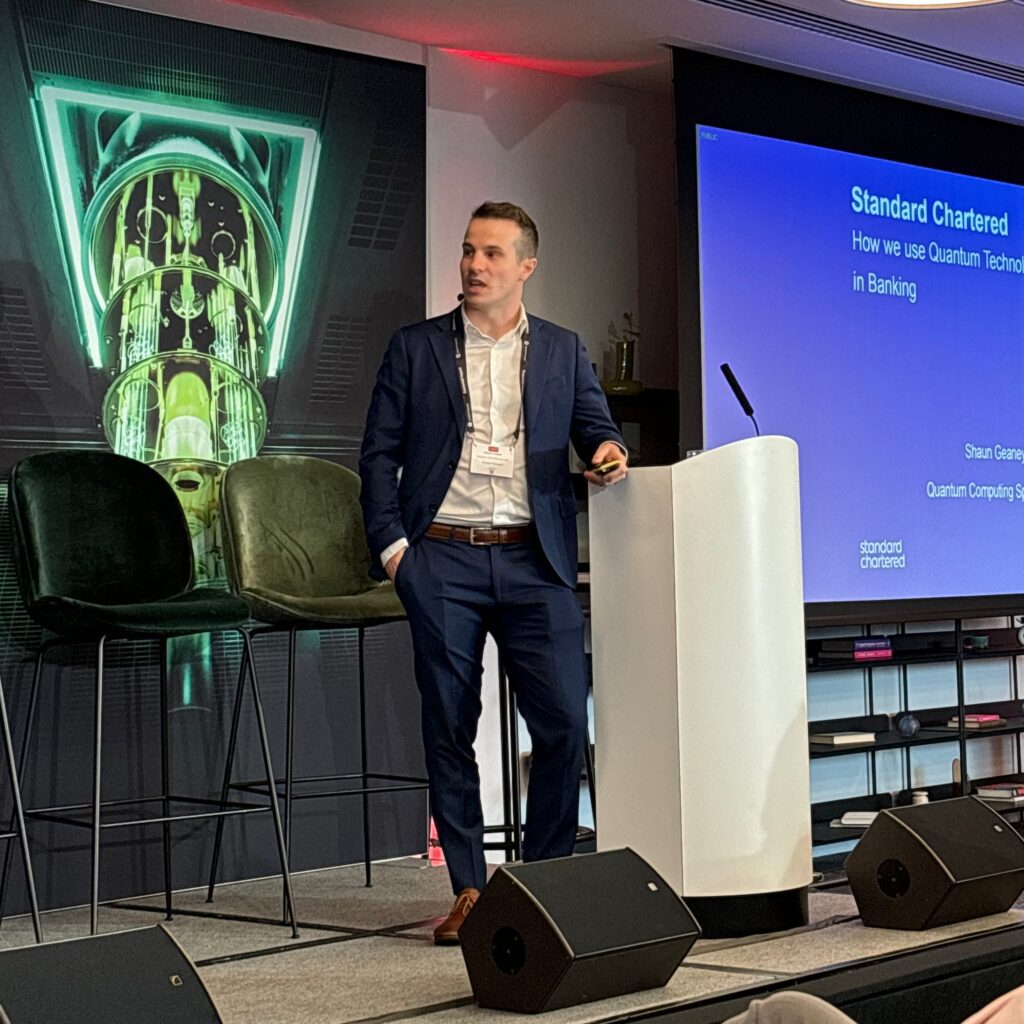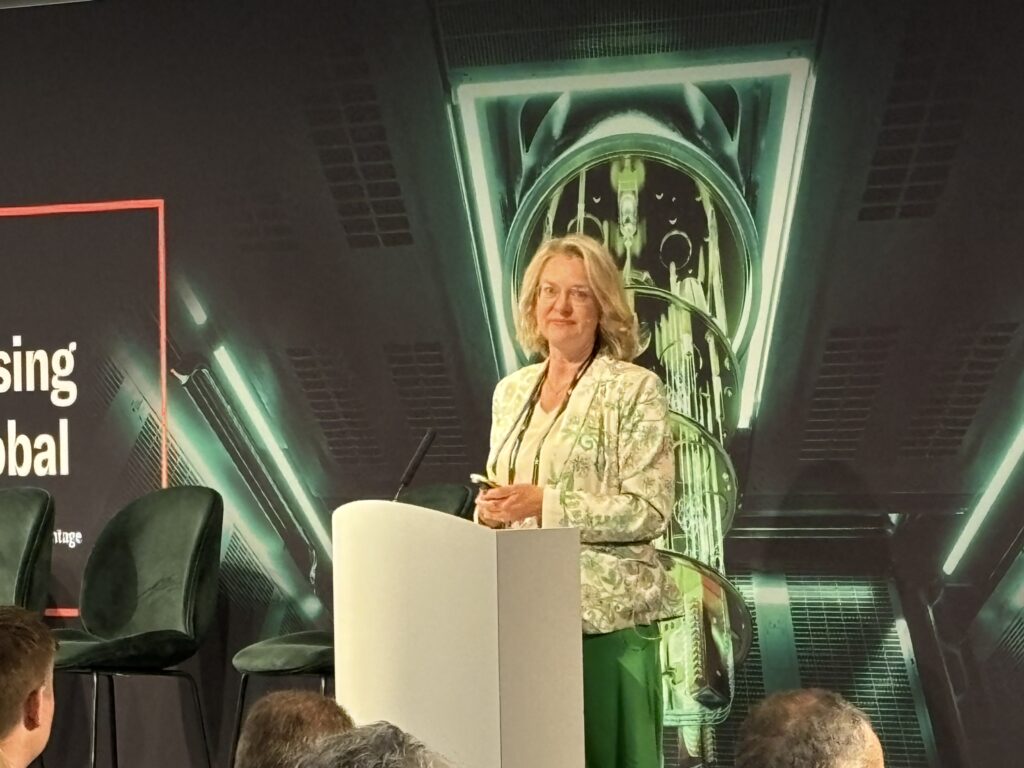Artificial Intelligence
Cyber
Future Telecoms
Materials
Quantum
Wise words and waggishness… February 2026
Reading time: 2 mins
Collaborations, use cases, photonics, fault tolerance and cash.
Billed as an event that would “distinguish hype from reality and create a path forward,” Economist Impact’s 3rd annual Commercialising Quantum Global conference tried its best to deliver on a difficult promise. Bringing together start-ups, tech businesses, investors, leading academics, and public organisations into a melting pot of technology talk, the aim was to add relevance through industry use cases.
For many it is still early days, but this event came hot on the heels of a number of deals and product launches, which have raised expectations – not least PsiQuantum’s eye-watering deal with the Australian government. This is essentially a AU$940 million (about £490m) investment to build the world’s first commercially viable quantum computer in Brisbane by 2029.
“Mother Nature has the same chemistry set that we’ve got”
Jeremy O’Brien, PsiQuantum
Jeremy O’Brien, co-founder and CEO of PsiQuantum, was one of the first people on stage at the Commercialising Quantum event. He talked about the need to leverage existing manufacturing capabilities to accelerate advancement in quantum, and highlighted recent developments in scaling up qubits using photonics. O’Brien also emphasised the importance of building fault-tolerant quantum computers to address sustainability challenges, such as improving battery development.
“Mother Nature has the same chemistry set that we’ve got,” said O’Brien. “Now we humans are prone to thinking that we already live in an advanced technical, technological age and we’ve got all this mastery over science and engineering and so on. I didn’t see us doing anything very comparable to what Mother Nature does with chemistry.”
O’Brien’s point was that quantum computers will enable researchers to model nature, to solve problems through a greater understanding of how chemistry works. He gave an example of the lithium ion battery in mobile phones.
“We don’t understand how those things work,” he said, “and nor will we ever be able to simulate the chemistry in those batteries on any conventional computer. Obviously if you don’t understand how your latest greatest technology works, it is a huge impediment to designing better batteries.”
The event was being held at 22 Bishopsgate in London, a modern, mixed-use building of mainly office space that sits on the site of what was Standard Chartered Bank’s headquarters in the 80s and 90s. That coincidence may have been lost on Shaun Geaney, quantum computing specialist at Standard Chartered, who was at the event talking about how the bank is looking to use the technology through partnerships and ecosystems.
“The bank sees quantum computing as a real business initiative,” said Geaney. “We work in areas such as transaction banking, with big corporates, the financial markets doing trading of commodities, FX and so on. We work to solve problems, in parallel with the AI team.”

Geaney talked about the development of quantum algorithms to mimic classical models and the potential for quantum computing to improve predictive modelling. He also highlighted the advantages of quantum computing, such as increased accuracy and data efficiency, and talked about the concept of reservoir computing, a novel machine-learning algorithm that has shown promising results in simulating chaotic systems. But he saved his best for last.
“We’re working on an internal project that is hopefully going to lower the high barrier to entry to quantum computing,” teased Geaney. “We want to be able to break open the research silos and introduce more collaboration within the industry. So, we’re currently creating a platform to address this. It’s in the minimum viable product (MVP) stage. We’ve got interest in backing from two large institutions who are working within the quantum industry.” (Contact Shaun on LinkedIn for more info).
The Danes were also in town, on the back of the UK-Danish quantum research deal announced last month. “Welcome to ‘Quantumhagen’” said Maria Genckel, chief marketing officer at Sparrow Quantum, one of a number of Danish start-ups at the event (which also recently struck a deal with UK-based ORCA Computing, amongst others).
The event saw a number of Danish speakers, including the Danish Ambassador to the UK, René Dinesen, and founders from companies such as Partisia, Kvantify and Sparrow. Lene Oddershede, a senior vice-president at the Novo Nordisk Foundation, was also there to talk about the recent announcement of a €188m fund to help build a quantum start-up hub in Denmark.
Novo Nordisk is a Danish pharmaceutical company (with a market value of over $570bn, according to Fortune) and its Foundation arm invested and awarded grants to the tune of €1.2bn last year, in a mix of science and humanitarian projects. The Danish government has also backed the country’s drive towards developing quantum computers with a €160m research fund until 2027.
Much of the talk among the Danish businesses though was the need for collaboration and they are looking to the UK to forge stronger ties.

“When talking about larger quantum systems, it’s only going to be photonics that will enable scalability. By using light, we can do all the cool stuff with quantum,” said Richard Murray, co-founder and CEO at ORCA Computing.
Murray talked about the need to “go outside” – to take quantum photonics from the research lab into the real world. While he said that ORCA is helping to lay the groundwork for future telecoms and photonics, Murray also talked about the role it can play in datacentres.
“We’re starting to eke out early wins with our customers,” said Murray, who added that the company would install a further five computers in customer sites this year.
The company used the event to announce it had done a deal with Montana State University to supply two PT-1 quantum photonics systems, adding to its recent announcement of a collaboration with the BT Group to help showcase its Quantum Data Centre of the Future project. [Watch out for our interview with Richard Murray later this month.]
Another growing theme is the pay-as-you-go quantum computing model, lowering the barrier to entry for researchers. A number of companies are starting to offer this approach, not least AWS with its cloud-based Braket, a quantum computing research setup.
“For the first time we’re actually expanding the Braket service into the European Union,” said Stefan Natu, head of product development of Amazon Braket at AWS. “Now customers in the EU can freely experiment with the system on a pay-as-you-go basis. And they can do this with no upfront commitments, no upfront costs.”
Boston-based QuEra Computing, a spinout from MIT, has been working with AWS since 2022 on this idea of a cloud-based model for quantum. Today, QuEra offers customers access to its 256-qubit, neutral atom range of quantum machines, something which QuEra’s chief commercial officer, Yuval Boger, says is already reaping benefits both for customers and for QuEra’s own understanding of how the machines manage workloads. Morgan Stanley, Airbus and BMW are just some of the names using the service. [Watch out for our upcoming interview with QuEra.]
“If we look at greenhouse gas emissions, 73% come from energy. So therefore it is one of the industries that has to be decarbonised at pace”
Zoë Reich, Octopus Energy Generation
Understanding use cases is of course key to its progression, something not lost on Zoë Reich, general partner at Octopus Energy Generation. Reich talked about how quantum computing can optimise the industry.
“If we look at greenhouse gas emissions, 73% come from energy. So therefore it is one of the industries that has to be decarbonised at pace,” said Reich. “In terms of the area of applications that will need quantum computing, alongside that classical computing infrastructure, it can fall into numerous groupings, including the likes of energy system optimisation, grid management, carbon capture and storage, as well as advanced materials discovery. We ourselves are predominantly a retail house. So our use will be very different from the likes of Shell or Eon. So we’re going to focus mainly on some of the optimisation problems, particularly in terms of smart grid management, and storage.”
Reich also emphasised the importance of leveraging customer interaction data to improve customer engagement and decarbonisation in the energy industry, while ensuring grid stability and flexibility. This is where, she believes, quantum’s processing ability will make a significant impact.
The Commercialising Quantum event was also used as a platform for news. Quantinuum claimed its H2-1 with 56 trapped-ion qubits quantum computer, “will make Quantinuum’s processor capable of challenging the world’s most powerful supercomputers.” The machine was created and tested in partnership with Quantinuum’s long-term collaborator JPMorgan Chase and researchers from Caltech and Argonne National Laboratory.
Q-CTRL, the National Quantum Computing Centre (NQCC) and Quandela also made announcements, but perhaps the biggest issues emerging from the event were the need for post-quantum security and creating a quantum-ready workforce (which the NQCC wants to champion). These issues will impact all industries, so we will be taking an in-depth look at both of these areas in the coming months – stay tuned.

Working as a technology journalist and writer since 1989, Marc has written for a wide range of titles on technology, business, education, politics and sustainability, with work appearing in The Guardian, The Register, New Statesman, Computer Weekly and many more.
Quantum
Reading time: 10 mins
Quantum
Reading time: 10 mins
Future Telecoms
Reading time: 2 mins
Quantum
Reading time: 11 mins
Quantum
Reading time: 5 mins